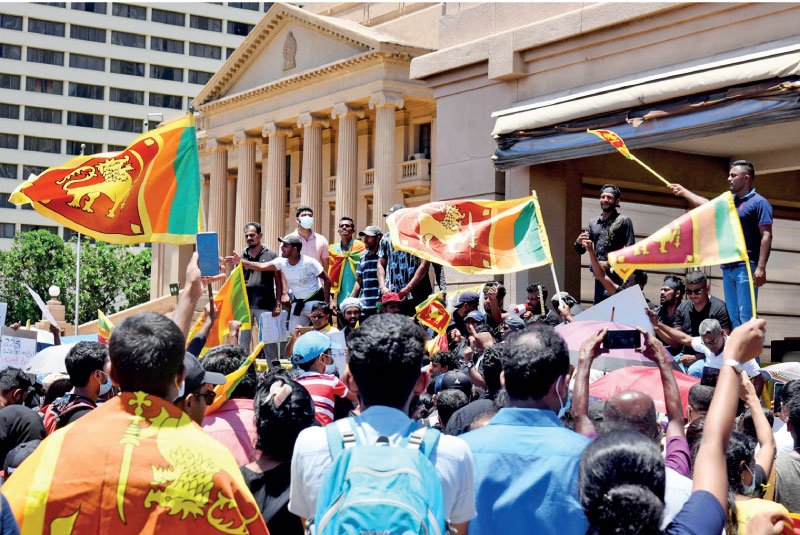Friday Feb 20, 2026
Friday Feb 20, 2026
Friday, 29 April 2022 00:00 - - {{hitsCtrl.values.hits}}

The responsibility of intellectuals is to perform the more modest, inductive work of articulating theory that strengthens the people’s call for change. Only once this task has been undertaken in earnest will we be able to answer in the affirmative whether the demand to throw out the Rajapaksas can also become an intellectual reckoning in Sri Lanka
 The US economist J.W. Mason recently wrote on social media, “If the risk of inflation justifies throwing millions of people out of work and suppressing wages for many millions more, it ought to justify other things too. If the only sacrifice being considered is by low-wage workers, you have to wonder what the real motivation is.” Mason was discussing the arguments that the economic establishment in the US and broader Western world is making to get the Federal Reserve to raise interest rates. But his observation hints at the class interests behind its proposals.
The US economist J.W. Mason recently wrote on social media, “If the risk of inflation justifies throwing millions of people out of work and suppressing wages for many millions more, it ought to justify other things too. If the only sacrifice being considered is by low-wage workers, you have to wonder what the real motivation is.” Mason was discussing the arguments that the economic establishment in the US and broader Western world is making to get the Federal Reserve to raise interest rates. But his observation hints at the class interests behind its proposals.
Or as he put it in a similar, if more sympathetic, overview of the impact of the 2008 financial crisis on the discipline of economics in Jacobin magazine: “Keynes famously wrote that ‘Practical men who believe themselves to be quite exempt from any intellectual influence, are usually the slaves of some defunct economist.’ But in recent years the relationship seems to have been more the other way round. If we want to change the economics profession, we need to start changing the world. Economics will follow.” Mason, of course, is not alone. He represents a wide and growing network of progressive economists who are rethinking what is behind, for example, rising prices.
The current conjuncture of global crisis and working people’s protests have forced open new horizons for re-imagining not only economics as a discipline, but the global economy as such. There are many more examples. Renewed visions of global solidarity aim to confront the dramatic consequences of the unequal recovery from the COVID-19 pandemic, which has been compounded by geopolitical polarisation. For these examples to be effective in Sri Lanka, however, they must be thought carefully in terms of the existing political divide within the country. Are we on the brink of a similar, dramatic change in economic thought?
The invisible hand of the people
For the economic establishment in Sri Lanka, the current crisis, including the recent default, has put them on the defensive. Establishment experts face a paradox. They argue that a policy response must be rooted in the arcane knowledge that they have acquired over the years. But if we must rely on them to get the country out of the crisis that developed over the same period, then who is responsible for it? The initial answer is easy: the politicians who failed to listen. The experts’ theory of change is that politicians respond to incentives. Because of populist promises to the people, including handouts, the system became economically unsustainable. The real problem is that the politicians have not been authoritarian enough in restraining public consumption.
Earlier, this argument could be made in polite conversation without raising eyebrows. But the discussion is increasingly awkward and circumspect. Many within the wider social group of academics and intellectuals sympathise with the demands of the movement to oust the Rajapaksas. We now see what happens when an “efficient technocrat” comes into power, despite the credulous enthusiasm with which the Advocata Institute, for example, initially greeted Gotabaya upon his election. In its press release on 30 November 2019, it wished his Government the best in its efforts to “establish meritocracy, improve government efficiency and promote prosperity.” If such actors have not already been discredited, we must ask what kind of understanding of politics they have if, even in a perfunctory way, they assumed that Gotabaya could be a straightforward vehicle for their program.
Now that the myth has been punctured, other explanations are brought to bear. Specifically, the regime’s self-destructive Sinhala Buddhist nationalism and authoritarian consolidation appears to be an area of consensus among factions with otherwise competing economic ideologies.
But replacing one view of Gotabaya with another will not be enough if the economic establishment is not willing to undertake serious self-critique of its explanation of Sri Lanka’s political economy. If the establishment prefers a system in which a market-dominated economy operates free of corruption, then why has this goal been impossible to achieve for so long? The answer so far has not been based in historical explanation, so much as it is rooted in an ontological fear of the masses. According to this understanding, the masses, with their incessant demands, created the space for demagogues. In general, pandering leaders fool the crowd. But the masses also enable them. By waving the magic wand of corruption, the economic establishment has a ready-made explanation for this vicious cycle.
The result is that corruption discourse has made intellectuals practically incapable of thinking what the State can and should do under the pressure of mass movements in a period of economic collapse. Corruption is also a convenient rhetorical device for political parties lacking a deep social base, to capitalise on cynicism and disenchantment with the political process. But it blinds us to the urgent need to redistribute wealth, extend decommodified services, and marshal administrative capacity. The fundamental reason why corruption discourse is ineffective as the primary way of framing the crisis is that it denies people insight into their own collective agency, and the crucial role they have in strengthening State capacity.
Holding politicians accountable does not mean slashing the State to the bone. It means asking, what are the goals that the people want to prioritise? Every time someone asks, what is the alternative, instead of trying to identify isolated policy proposals, we should take it to mean something much deeper: what are the alternative principles on which social order can be re-organised? The current political moment offers an opportunity to rethink what is possible in terms of removing rulers who were previously considered invincible from power. It can and must be extended further to question the elitist, ideological framing of policy—regardless of whether one self-identifies as neoliberal or not—which has dominated the discussion so far.
The responsibility of the intellectuals
Currently, however, to question this ideology is to put oneself beyond the pale. Critics can hardly be taken seriously if they challenge the International Monetary Fund’s (IMF) analysis and recommendations putting forward further trade liberalisation, for example, because what is the alternative? We can only tweak and work within the existing system. Anything else is considered utopian and naïve at best. Moreover, in bad faith the establishment conflates criticisms of the IMF, whether from the progressive left or the Rajapaksa regime’s cronies, to try and discredit alternative thinking in general. The mask, however, is coming off. Many within the wider public sphere are starting to realise that the economic establishment is not neutral, that it has its own interests, and that for too long these have been tied to the comprador elites who got Sri Lanka into this mess. Even sections of the business elite realise that the economy can no longer be run the same way.
To again compare with Mason’s point in a different context, Sri Lanka, to undergo an intellectual reckoning, must first experience a political reckoning. That process appears to have begun. The political ambivalence of the economic establishment is apparent when it seeks to corral the popular forces that have been unleashed, channelling them into neat solutions that somehow maintain the underlying order, but with a new political class in charge. If we have learned anything by this point, however, it is that this persistent mythology cannot explain the real source of power that the people have over their leaders. Their leverage does not come from deferring to leaders, who in turn defer to experts. Instead, it comes from their collective strength to demand that leaders fulfil their obligations to society.
In the wake of the resurgent mass movement, there is an opportunity to listen to what people are asking. By paying close attention to those demands—to control prices, to provide food and other essentials, and ultimately to guarantee livelihoods and social reproduction—we might discover the actual mechanisms that can constitute an alternative, sustainable order. These would be the only real, effective basis on which to negotiate with otherwise overwhelmingly powerful external actors.
Accordingly, the responsibility of the intellectuals is not to speak over people’s heads and impose the claims of abstract, idealistic economic “laws” on the movement to restrain it. In any case, these laws, as progressive economists are already pointing out, are very much debatable and further reflect an underlying set of political values. Instead, the responsibility of intellectuals is to perform the more modest, inductive work of articulating theory that strengthens the people’s call for change. Only once this task has been undertaken in earnest will we be able to answer in the affirmative whether the demand to throw out the Rajapaksas can also become an intellectual reckoning in Sri Lanka.